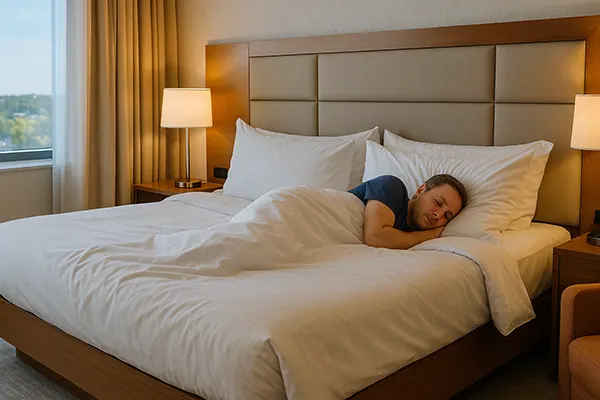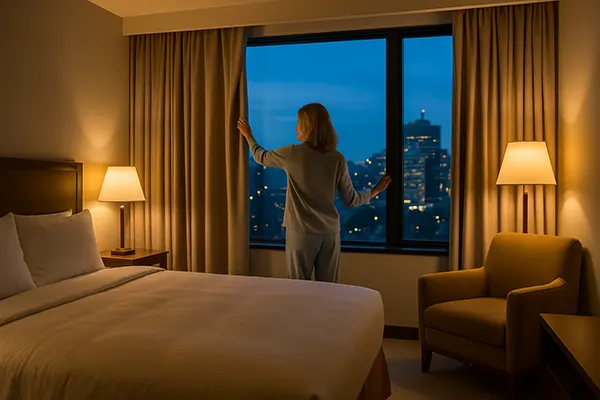
Sleep on the Road: How Hotel Choice Shapes Your Rest
Travelling often brings excitement, but it also disrupts daily routines — especially sleep. A comfortable night’s rest is essential to recharge, boost mood, and maintain focus. Yet, not all hotels guarantee peaceful sleep. The right choice can make the difference between waking up refreshed or exhausted. Let’s explore how hotel features and thoughtful planning influence the quality of rest during travel.
Why Sleep Quality Matters When Travelling
Sleep directly affects how well you enjoy your trip. Poor rest leads to fatigue, irritability, and difficulty concentrating. Whether travelling for business or leisure, consistent sleep is crucial for both physical and mental recovery. Studies by the World Sleep Society show that even one night of poor rest can lower energy levels and immune response, increasing stress and discomfort while away from home.
Hotels that prioritise sleep comfort help guests maintain stable circadian rhythms. This means providing an environment that mimics home comfort — proper temperature, clean air, and minimal noise. Business travellers and tourists alike increasingly choose accommodation with features designed for restorative rest. Analytical comparisons of different accommodation types, presented on https://hotel–madrid.net/, illustrate how interior design and service standards can influence rest quality during travel.
Choosing hotels that promote sleep health is now part of responsible travel planning. This includes checking guest reviews, verifying bed quality, and ensuring that the location doesn’t expose guests to city noise or nightlife disruptions.
Hotel Features that Promote Better Sleep
Modern hotels have started investing in “sleep-focused” amenities. These include rooms equipped with anatomical or memory foam mattresses that support spinal alignment and reduce pressure points. Proper bedding plays a key role — hypoallergenic materials prevent irritation and overheating during the night.
Soundproofing is another essential factor. Premium hotels often use triple-glazed windows and insulated walls to block out city traffic, elevators, or other guests. Some brands even implement “quiet zones” where staff limit cleaning hours and minimise corridor noise during rest periods.
Many international hotel chains now offer dedicated sleep programmes. These include white noise machines, aromatherapy kits, blackout curtains, and smart lighting that adjusts to your sleep cycle. Such initiatives turn sleep into a central part of the guest experience rather than an afterthought.

How to Evaluate Sleep Conditions Before Booking
When planning accommodation, travellers should assess specific indicators of sleep quality before confirming a reservation. Start by reviewing hotel descriptions for mentions of mattress types and soundproofing. Phrases such as “orthopaedic bed,” “quiet rooms,” or “sleep-enhancement amenities” often indicate genuine attention to comfort.
Guest feedback can be even more valuable. Independent reviews on booking sites or travel forums reveal real experiences of noise levels, bed comfort, and room temperature control. Pay attention to comments about nearby traffic, construction, or nightlife, as these often determine whether a stay will be restful or not.
Additionally, don’t overlook room location. Request a room on higher floors or away from lifts and busy streets. Some hotels allow you to select your preferred pillow firmness or provide temperature control devices upon request — small details that can significantly improve your rest.
Practical Tips for a Restful Stay
Bring your own sleep essentials if possible. A familiar pillowcase or travel pillow can help maintain comfort and a sense of home. Noise-cancelling earplugs and an eye mask also help neutralise unpredictable surroundings.
Adjust your schedule gradually when travelling across time zones. Exposure to daylight during the morning helps your body adapt faster to new sleep patterns. Avoid heavy meals, caffeine, and screen exposure in the evening, as they delay melatonin production and make it harder to fall asleep.
Lastly, treat rest as an essential part of your trip rather than a luxury. Choosing hotels with proven sleep amenities isn’t just about comfort — it’s an investment in your overall well-being, productivity, and enjoyment of the journey.
